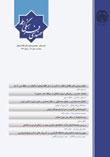فهرست مطالب
فصلنامه مهندسی فرهنگی
پیاپی 53-54 (خرداد و تیر 1390)
- تاریخ انتشار: 1390/05/01
- تعداد عناوین: 8
-
صفحه 6
- مقالات
-
Page 8An effective education system has a determinant role in the comprehensive development and progress of a society. This influential institute i.e. education system is the product of modern world. The aim of this research is to investigate the modernization signs in the I. R of Iran’s education system regarding the generalities of Iran’s education system in the year of 1367.The method of this research is analytical –descriptive. Originality of human, tolerance, freedom, rationality, science believing, secularism, change and development are some of the main principles of modernization. General education based on the factorymodel, standardization and expertise are the marginal principles of modernization.
-
Page 27It is more than two decades that globalization has turn into an important political, economic, social and especially cultural topic. Many experts consider globalization process positively and hopefully. Some of them are also critics of globalization process. Globalization resulted in some concerns about the future especially in the Islamic countries and cultural identity of youth. Globalization is not a decision, or a decision making,or a choice; rather than it is a phenomenon that will sooner or later take place. Culture is never static. It is dynamic. Every moment we are being transformed, always growing. The effect globalization has had on culture is immense and diverse. It has affected people's cultural behaviors in different ways.
-
Page 44The importance of culture whiten new current developments is outstanding and some scholars believe that the sixth continent to be occurring. Many also believe that the 21th century must be called the centaury of culture and cultural paradigms. Ethnic is one of the culture’s categories. From the viewpoint of language and ethnic diversity, Iran stands the 16th worldwide. Increasingly paying attention to the culture and ethnic is important. This goal will be attained through more investment and improving the efficiency of culturalmanagers. In this paper some categories such as definition of culture, management of culture, diversity and management of diversity, ethnic and ethnic diversity in Iran and the world were investigated.
-
Page 60The aim of this paper is to investigate the role of cultural heritage in maintaining and strengthening the society's cultural identity. One of the main challenges in the developing countries is cultural alienation when they face the phenomena of globalization and new cultures. Historical past time, ancient epics, father's land, mother tong, beliefs and tribal customs, the national honored, religious pioneers, ethnic zealotry, hereditary art and literature are the main elements constructing the society's culture identity. Monuments, places, artistic works, handmade works and so on as the cultural heritages are one of the most effective factors in strengthening any society's identity. Maintaining and strengthening the society's cultural identity is considered as the factor of survival and continuity of culture. Maintaining, strengthening and making known the cultural identity is also considered as the cause of self -awareness and turning to the self and defendingagainst alienation as one of the main challenges in the developing countries.
-
Page 67Culture is a complicated concept that can influence the processes of production, consumption and mutually seems to be influenced by them. Productivity is a common link between culture and economic events. Increased productivity results in decreased consumption and improving the consumption results in increasing the productivity. In this research; mutual relationship among culture, productivity, and consumption pattern in Iran are studied. The results of research show that consumption pattern in our country are not in accordance with the global standards.
-
Page 75Consumption is one of the macroeconomic indices that many other chains of economy including supplying, production, trading and distribution are under its influence. Consumption and consumer play a critical role in the economic relations. It is possible to investigate the main and influential factors on the consumption level and formation of framework of consumption pattern from different dimensions. Some of these factors relate to the society’s cultural issues. Therefore, identifying influential factors on the culture and its development strategies possess a special status in policy making field. Through such a way it will be possible to prevent our society of being affected by a consumption economy. Generally speaking, consumption economy is an undesired condition in which consumption goods are used instead of capital goods. Unfortunately in a consumption economy it is impossible to save money to invest and make any progress.
-
Page 84This research has been done to investigate the impacts of cultural beliefs of government managers of Rasht city offices on applying decision making styles in management. The method of this research is descriptive. The sample society are all of the government managers of Rasht city offices overall 620 people. Through using a classified sampling some people about 129 persons were chosen as the sample society. The gathered data were analyzed through using descriptive statistical indices. Our findings showed that all the sample society has proven the role of the beliefs, tendencies and attitudes, thought and minds, behaviors and realities in applying decision- making styles in management.


